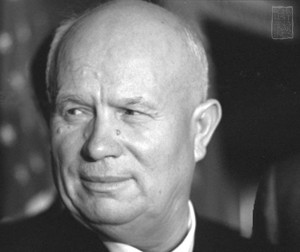
Note: I was 11 years old and in 6th grade at Shorewood Elementary school in a suburb just south of Seattle, Washington as the Cuban Missile Crisis unfolded in October of 1962. During the crisis I would go to school every day, play intramural football and hang out with my friends, as if everything was normal. But things were far from normal. Unbeknownst to me, to my friends, to my family and to most people in our nation, our future survival was hanging by the slenderest of threads; utterly dependent on the ability of the two super power leaders, Kennedy and Khrushchev, to resist the forces in their own governments pushing them toward war while, at the same time, striving to find some kind of common ground. Here is Part IV of the whole story of the Cuban Missile Crisis… the most dangerous two weeks in human history…MA
Early in the evening of Friday, 26 October, when the crisis was perhaps at its darkest moment, the President and Ex Comm received an unexpected jolt of hope in the form of a unique letter from Nikita Khrushchev. The letter, Khrushchev’s response to JFK’s letter of Thursday the 25th, was remarkable for several reasons. First, it was devoid of what, to that point, had been the customary Soviet belligerence. More importantly, Khrushchev imbued the letter with emotion and humanity from beginning to end and from his words it was clear that here was a man (Khrushchev) who was willing to communicate and take the actions necessary to step back from war. In the letter he stated that it was important that neither the U.S. nor the Soviet Union succumb to “petty passions” or “transient things”. Calling on his own history in both World Wars, Khrushchev then went on to state:
“…If indeed war should break out, then it would not be in our power to stop it, for such is the logic of war. I have participated in two wars and know that war ends when it has rolled through cities and villages, everywhere sowing death and destruction.”
Concerning the missiles in Cuba and the possibility they would be used to attack the United States, he stated:
“You can be calm in this regard, that we are of sound mind and understand perfectly well, that if we attack you, you will respond the same way. But you, too, will receive the same that you hurl against us. And I think that you also understand this…This indicates that we are normal people, that we correctly understand and correctly evaluate the situation. Consequently how can we permit the incorrect actions which you ascribe to us? Only lunatics or suicides, who themselves want to perish and destroy the whole world before they die, could do this.”
Khrushchev continued the letter by saying that it was useless for the United States to conduct the quarantine as there were now no armaments shipments going to Cuba since the missiles and equipment needed for them were already there, thus acknowledging for the first time officially that the Soviets had placed missiles in Cuba. The reason, he stated, they had done it was that the United States was actively interested in overthrowing the Cuban government and that the Soviets wished to help Cuba protect itself. And then, in a remarkable statement, he proposed a way out of the crisis:
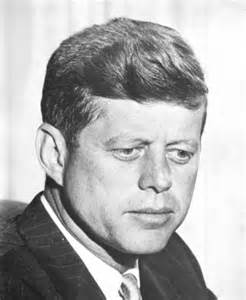
“If assurances were given that the President of the United States would not participate in an attack on Cuba and the blockade was lifted, then the question of the removal or the destruction of the missile sites in Cuba would then be an entirely different question. Armaments bring only disasters. When one accumulates them, this damages the economy, and if one puts them to use, then they destroy people on both sides. Consequently, only a madman can believe that armaments are the principle means in the life of society. No, they are an enforced loss of human energy, and what is more are for the destruction of man himself. If people do not show wisdom, then in the final analysis they will come to a clash, like blind moles, and then reciprocal extermination will begin.”
The Soviet Premier closed his letter with the following appeal to JFK:
“…Mr. President, we and you ought not to pull on the ends of the rope in which you have tied the knot of war, because the more the two of us pull, the tighter the knot will be tied. And a moment may come when that knot will be tied so tight that even he who tied it will not have the strength to untie it, and then it will be necessary to cut that knot, and what that would mean is not for me to explain to you, because you yourself understand perfectly of what terrible forces our countries dispose. Consequently, if there is no intention to tighten that knot, and thereby doom the world to the catastrophe of thermonuclear war, then let us not only relax the forces pulling on the end of the rope, let us take measures to untie that knot. We are ready for this.”

The hopeful aspect brought about by the receipt of Khrushchev’s letter was reinforced by a message from the Soviets that had been relayed through a most unlikely source, an ABC newsman named John Scali. Scali had been approached by an official from the Soviet embassy and asked to relay a proposal to the President that fleshed out what Khrushchev had mentioned in his letter. If the U.S. would lift the blockade and pledge not to invade Cuba, the Soviet Union would remove the missiles under United Nations inspection. Outside of the few hours on Wednesday morning when it looked like the Soviet ships were turning around, Khrushchev’s letter and the proposal relayed by Scali were the first hopeful indications that the crisis could be resolved without the invasion of Cuba and war. Kennedy directed that the messages and proposal be reviewed by the State Department and an answer proposed that the Ex Comm group could review and approve on Saturday morning. For the first time since the crisis began eleven days earlier both the President and his brother were able to end a day with a shared feeling of optimism; just maybe they would find a way to resolve this mess and not go to war.
On Saturday morning, the 27th of October, the optimistic aspect the crisis had taken on the night before was abruptly dissipated when the FBI relayed the news that the Soviet personnel in New York (at the UN) were preparing to destroy their sensitive documents on the assumption that the United States would be invading and attacking Cuba. They were preparing for war. Compounding this was the fact that a new letter had been received that morning, ostensibly from Khrushchev, that altered his proposal in the previous letter as well as the proposal that had been forwarded through ABC newsman John Scali. This new letter contained none of the emotion and reflective language that had characterized Khrushchev’s letter of the day before, leading many in Ex Comm and the CIA to believe Khrushchev had been co-opted by hard line elements within his own government. The original letter, they felt, was written by Khrushchev while the new letter appeared to be written for him. The new letter proposed a compromise that required the United States to withdraw its missiles based in Turkey in exchange for the Soviet withdrawal of its missiles in Cuba, and that the United States would pledge not to invade or interfere with Cuba with the Soviets making the same pledge as regards Turkey. Further compounding matters was news delivered by Defense Secretary McNamara that the Soviets and Cubans were now working around the clock to complete the missile sites and make the IL-28 bombers operational.
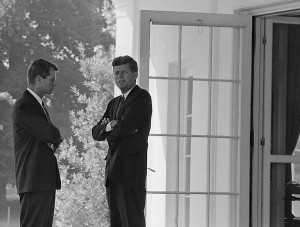
The Soviet proposed trade off of the Cuban missile withdrawal in exchange for the withdrawal of U.S. missiles in Turkey complicated things significantly for JFK. From the Soviet point of view it was tit for tat. For JFK, however, should he agree to the missile withdrawal exchange under threat from the Soviets, he would appear weak to both his political/military hardliners at home as well as in the eyes of the world. In truth, Kennedy didn’t care about the missiles in Turkey. Those missiles were old and obsolete and five months earlier he had asked the State Dept to negotiate with Turkey for their removal. U.S. Polaris nuclear submarines in the Mediterranean Sea would do a far better job defending Turkey from Soviet threat than the old land based missiles stationed there. The Turkish government objected, however, so the State Dept dropped it and the missiles stayed. Now here they were, a negotiating chip in the tense standoff between the two super powers; something that would not have happened had Kennedy’s wishes been complied with earlier.
The new Khrushchev letter also created another problem. The sharp difference in the letter’s tone from the one received a few hours earlier threw into question just who was calling the shots in the Soviet Union. The President and the Ex Comm group now had to consider the possibility that a coup had taken place and that Khrushchev was no longer in control. Whatever hope had been generated from what transpired the night before was now gone. With all this to consider, that morning’s tense Ex Comm meeting was made more so when the Joint Chiefs of Staff arrived at the meeting with their latest proposal for handling the crisis; an air strike to be launched two days hence to be followed by an invasion. The blockade, they said, was far too weak a response to the Cuban missile threat; therefore they were not surprised that it did not work. Direct military force, they said, was the only thing the Soviets would understand.
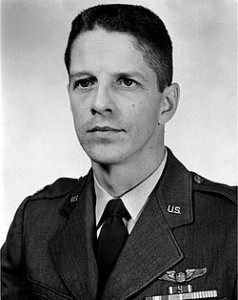
If this wasn’t bad enough, the situation was about to get worse. As the Ex Comm group members were arguing over their options the news arrived that a U-2 spy plane on a mission over Cuba had been shot down and its pilot, Major Rudolf Anderson Jr., had been killed. You will recall that several days earlier the Ex Comm group had discussed and decided on what the response would be to just such an instance. It was vital that the U-2 flights continue so that progress on the missile site construction could be monitored and everyone in Ex Comm, including the President, felt a powerful obligation to protect the pilots. For that reason they had agreed at that time that the U.S. response to an attack on our over flights would be to destroy the SAM (Surface to Air Missile) sites firing at our planes. JFK had agreed to this. But now, faced with the pressure of implementing that decision, and realizing fully that an attack on the SAM sites might well be the fillip that propelled them and the whole world over the precipice, Kennedy held back. He did not authorize the reprisals:
“…It isn’t the first step that concerns me,” he said, “but both sides escalating to the fourth and fifth steps—and we don’t go to the sixth because there is no one around to do so. We must remind ourselves that we are embarking on a very hazardous course.”
Instead of authorizing the SAM site attacks he ordered that absolute verification be gotten that Major Anderson was indeed shot down and that the crash and his death were not accidental. He also wanted a very careful review to establish the likely Soviet responses to such an action and the steps and ramifications that would follow. Despite heavy pressure from the Joint Chiefs and others in Ex Comm to authorize the SAM site attacks, Kennedy once again held his ground. He would not commit to an action that he could not take back once done and that could possibly result in nuclear war and the deaths of millions.
It was against this backdrop of tension and of conflicting views in Ex Comm and from the Joint Chiefs of Staff, views that urged the use of military force and invasion against Cuba, that the State Dept submitted for review its proposed response to Khrushchev’s letter of that morning. The State Department response stated that there could be no trade of the missiles in Turkey for the missiles in Cuba and reiterated that any solution to the crisis had to start with the Soviets ceasing their construction of the missile sites. While most in Ex Comm agreed with the letter and thought it should be sent with minor revisions, Robert Kennedy, supported by Ted Sorensen, held out for a different approach. RFK thought that the letter as stated had too belligerent a tone and that the outright refusal of the Turkey/Cuba missile trade off would back the Russians into a corner, something the President had repeatedly tried not to do. Instead he and Sorensen proposed that they draft a letter accepting Khrushchev’s idea from his emotional letter of the night before; basically ignoring the whole Turkey/Cuba exchange as if it had never been brought up, but at the same time agreeing to lifting the blockade and pledging not to invade Cuba in exchange for the Soviets dismantling the sites and withdrawing the missiles from Cuba. It was a bold idea, but in light of the most recent Khrushchev letter most in Ex Comm thought it unrealistic, wishful thinking and so opposed doing it.
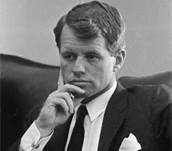
Despite the Ex Comm opposition RFK and Sorensen remained adamant that the State Dept letter should not be sent. Observing the impasse, JFK pulled his brother and Sorensen out of the meeting and had them compose an alternative response to Khrushchev’s letter along the lines they thought correct so he could then choose between the two. Forty-five minutes later he had the alternative letter in his hand. As they had proposed, the RFK/Sorensen response accepted Khrushchev’s proposal in his 26 October letter, making no mention of the 2nd Khrushchev letter and Turkey proposal of that morning. The United States would agree to end the quarantine with a pledge to not invade Cuba in exchange for the Soviets dismantling and withdrawing the missiles under U.N. Supervision. Much to the upset of the hard liners in Ex Comm and the Joint Chiefs, who still held out for air strikes and invasion, with few revisions the President accepted the letter and it was sent.
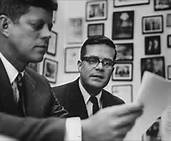
The letter was a calculated risk and neither the President nor his brother had any real hope that it would work. If, indeed, Khrushchev had been co-opted or there had been a coup by Soviet hard liners the letter’s acceptance of Khrushchev’s 26 October offer would be rejected. Meanwhile, time was running out and the missile sites were nearly completed. To prevent a possible first strike with those missiles, as General LeMay and the Joint Chiefs kept asserting the Soviets likely intended, the air strikes would have to happen very soon; i.e. within 48 hours. The President directed that Ex Comm reconvene that evening at 9PM and he and his brother with Secretary of State Dean Rusk spent the next few hours in his office discussing the situation. Out of this discussion it was decided that RFK would arrange another meeting with the Soviet ambassador Dobrynin in an effort to impress upon him the great concern JFK felt over the situation and to implore the Soviets to work with him to find a way out of war. There was enough time for one more round of diplomacy and the President would employ every avenue to find a way out.
Ambassador Dobrynin met Robert Kennedy that evening at 7:45 PM in RFK’s office at the Justice Department. Much later, in his memoirs, Nikita Khrushchev wrote of what had been reported to him by Ambassador Dobrynin as regards his talks with Robert Kennedy. According to Khrushchev, Dobrynin stated:
“Robert Kennedy looked exhausted. One could see from his eyes that he had not slept for days. He himself said that he had not been home for six days and nights. ‘The president is in a grave situation,’ Robert Kennedy said, ‘and he does not know how to get out of it. We are under very severe stress. In fact we are under pressure from our military to use force against Cuba…President Kennedy implores Chairman Khrushchev to accept his offer and to take into consideration the peculiarities of the American system. Even though the president himself is very much against starting a war over Cuba, an irreversible chain of events could occur against his will…If the situation continues much longer, the president is not sure that the military will not overthrow him and seize power. The American army could get out of control.’”
Whether JFK actually felt at that time that a coup against him could possibly occur in his own government is unknown. In light of all the evidence, of the antagonism of his military and intelligence community and of his assassination a year later, one would have to conclude that such an event was very possible. Could JFK and his brother have used this coup possibility to impress upon the Soviets the importance of resolving the missile crisis now, lest they (the Soviets) a couple days hence find themselves facing a hard line military junta in the United States? According to Khrushchev that is exactly what they did. RFK, in his Cuban Missile Crisis memoir, makes no mention of this however. Considering the sensitive nature of the subject matter it is likely he wouldn’t, even if he did say something like that to Dobrybin.
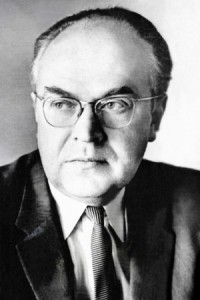
According to Robert Kennedy he told Dobrynin that President Kennedy did not want to go to war over Cuba, but that the Soviet installation of the missiles in Cuba was completely unacceptable and that the missiles sites had to be dismantled and the missiles removed. He told Dobrynin that shooting down the U-2 and killing Major Anderson was a very serious matter to the President. Dobrynin responded that the Cubans did not like the violation of their air space by the U-2s implying they had every right to fire on the planes. To that RFK stated that the Russians had forced his nation’s hand on the over flights by sneaking the missiles into Cuba in the first place while assuring the U.S. they would do no such thing. He then told Dobrynin that the President had great respect for the Soviet people and their courage and wanted to be able to peacefully coexist with the Soviet Union. But, he said, the U.S. had to have a commitment from the Soviets by the next day that the missiles would be removed and that without such a commitment the missiles would be destroyed. The subject of the discussion turned to the letter JFK had sent to Khrushchev earlier that day accepting Khrushchev’s proposal of the 26th ( that the U.S. end the quarantine and pledge not to invade Cuba in return for the Soviets dismantling the missiles under U.N. supervision). Dobrynin specifically brought up the removal of the U.S. missiles in Turkey in exchange for the Soviet removal of the Cuban missiles. RFK stated that there could not be such an exchange, but he also stated that the missiles in Turkey were old and that the President had wanted them removed for some time and that likely this would occur within a few months, thus implying the exchange could occur, but on a delayed basis, which would allow the President more latitude in dealing with the cold warriors in his military and intelligence agency. The conversation ended with Robert Kennedy reiterating to ambassador Dobrynin that the United States had to receive the Soviet answer within 24 hrs, after which time there could be no deal.
Robert Kennedy returned to the White House after the meeting with Dobrynin and reported to the President. Neither brother was particularly optimistic that the meeting or the letter the President sent to Khrushchev earlier in the day would bear any fruit and the fact was they were out of time; they could not let those missiles become operational. That evening JFK ordered twenty-four troop carrier squadrons of the Air Force Reserve to active duty in preparation for the invasion of Cuba. The fate of the world now rested in the hands of Nikita Khrushchev or whoever had supplanted him in the Soviet Union, and while the President still had hope that his last minute actions would be effective, the expectation was quite the opposite.
Sunday morning, October 28th, 1962; JFK was at the White House while RFK was with his daughters at a horse show that he had promised for months he would attend with them. Around 10 AM Robert received a phone call from Secretary of State Rusk stating that they had just been informed that the Soviet Union was willing to withdraw the missiles from Cuba. RFK rushed back to the White House and there received a call from Soviet ambassador Drobynin requesting that they meet immediately. At 11AM the two men met again in RFK’s office. Dobrynin told the Attorney General that a message had been received from Khrushchev saying that he was agreeable to dismantling and withdrawing the missiles under adequate supervision, that everything would work out, and that he extended his best wishes to the President and to his brother.
The world collectively exhaled. The Cuban Missile Crisis was over.
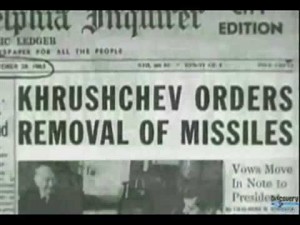
During these 13 days in October of 1962, President Kennedy, Chairman Khrushchev and their governments had taken their nations and, indeed, the whole world to the very brink of nuclear war before finding a way to take a step back. It was an experience neither leader wanted repeated, but as 1962 merged into 1963 Kennedy was under no delusions. The dangerous Cold War still persisted and the belligerent elements in his own government as well as the Soviet Union still wielded major power. The Viet Cong insurgence in Vietnam was gathering steam and that Southeast Asian nation was on the verge of becoming the next major crisis zone with all the attendant pressure to commit American troops and weapons. Nevertheless, catalyzed by how close to nuclear annihilation he and Khrushchev had brought the world, JFK began to re-evaluate things and it wouldn’t be long, as we shall see, before he took his first major steps designed to bring an end to the Cold War.
To be continued…
Copyright © 2013
By Mark Arnold
All Rights Reserved

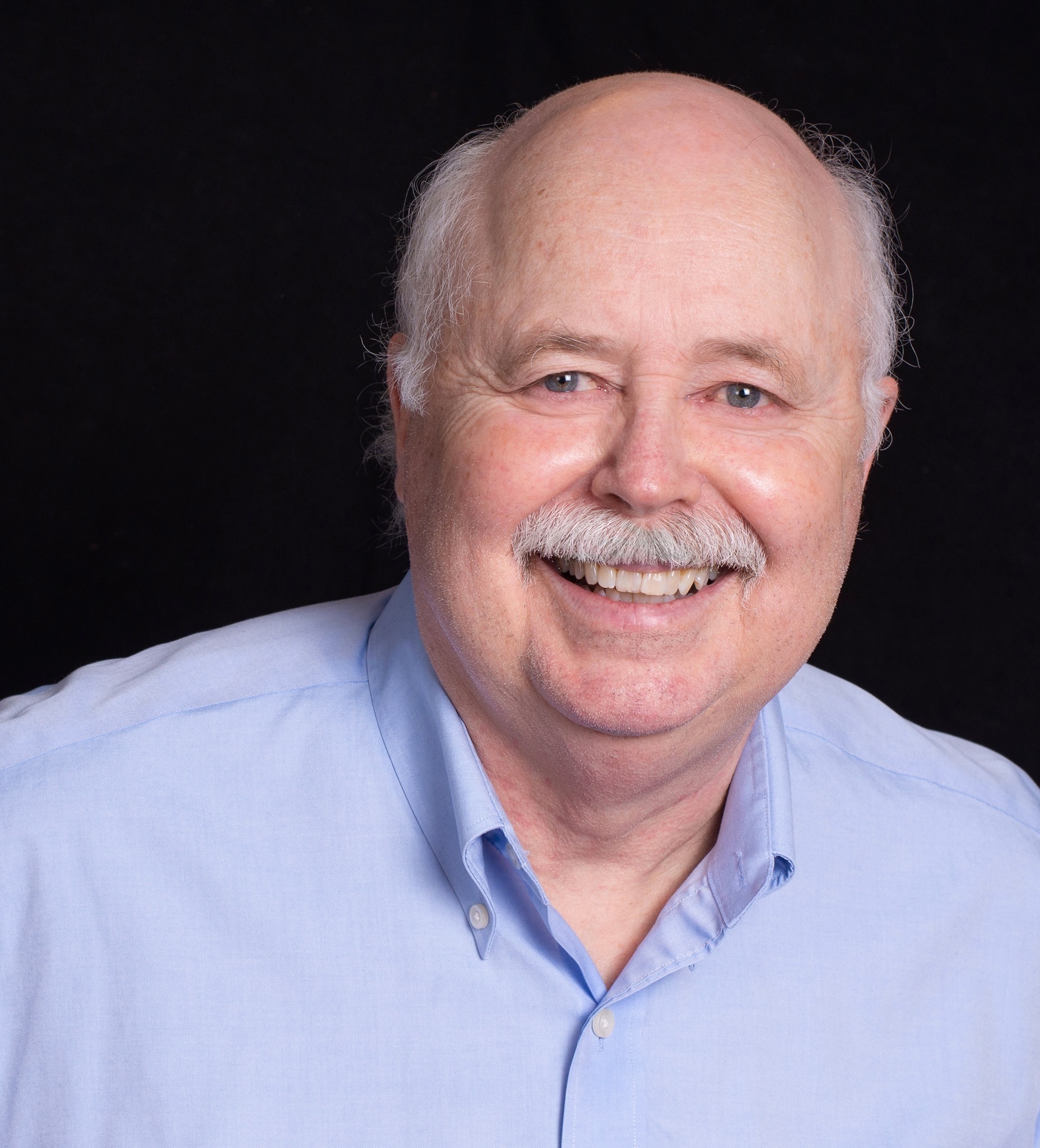
3 Responses
Hmmmmmmm,….. WTF!
Hey Steve! Please elaborate on what you are thinking about with your comment above. Thanks. L Mark
Note: This message was e-mailed to me by my friend Randy Gibson and is illustrative of the type of effect created on those who lived through the missile crisis and cold war era by the constant threat of nuclear war. Thanks for sharing Randy!
Yo Mark, Most Rev. Sage Historian,
Just finished reading your last blog. You’re good at captivatingly, compellingly encapsulating events. I have told you of how I felt during the Missile Crisis. I was sure we were done-for, all of mankind; nightmares I would later discover were coming from The WW II bombings of London and much deeper back…
I didn’t fully understand it all. I remember Khrushchev’s letter and posing that it meant he might be a good guy and for that I was attacked, called stupid and a sissy. (I was later labeled a Peacenik.) The overall opinion was that we should go bomb and kill all the commie rat bastards! The other boys liked to talk about it because they could get away with using such swear words when referring to communists. They were ogres to us. But I was confused by the fact that there were a lot of Russians living in Juneau (Alaska…where I grew up), old venerated families; and, too, there was the Russian Orthodox Catholic church there right next to the Roman Catholic Church and Parish. Were all these commies too??
Us kids had always been scared of old George Kotzoff, an elderly grouchy neighbor. Surely he must be a commie! He dressed like one, old baggy pants, stained white shirt, a cap and white beard. Like those other old Russian men around town. And some of the Native people who were Russian mix spoke in Russian as well as the Native Tlingit language. Creepy…did we have commies in our town? My father suggested we did, some Republicans and some Democrats were, he said. So who were??
I remember the town blowhard opinion leader, patriot; a tugboat captain name of W.H. “Kinky” Bayers, on the radio proclaiming, “…I’d rather see Nixon’s finger on the bombs button than Kennedy’s hand signing a surrender declaration…”
Ironically, a couple years later when I was doing peace and stop the war and anti- draft marches the same guys who had attacked me calling me a commie, stupid sissy for suggesting Khrushchev might be a good guy were marching along too.
What I really started to write you about was to share two events that happened to me years later in the military Coast Guard. In the winter of 1972 I was at the Coast Guard’s Engineering school at Yorktown, Va. situated right next to the historical battlefield. In fact one had to drive through the battleground to get to the school gates. I was driving my brand new Z-28 Camaro, the first new car I owned, with some friends returning from a rock concert in Norfolk. (The band was “Bread”, remember them?) On the radio, the news reported the US military going onto alert because of some something going on in Israel. Instantly, Memories of the Cuban Crisis slammed into me like a bludgeon blow!! All the terrors restimulated! And worse because now I was in the military!! I was senior to the others, so I suggested that we had better skip beer and pizza and get back to the base. The guys became concerned too. Back at base there wasn’t much going on because it was a school. Security was increased, guard posts doubled but that was about it. I spent a sleepless night.
A couple years later I was stationed at Pt. Vicente Lighthouse in Palos Verdes, Calif –in Los Angeles, as the Lighthouse Keeper. One night I was summoned from my room and told to report to the CO; there was an emergency…we might be going to go to war!!! Once again I was slammed by my memories of the Cuban Missile Crisis!! Was it all happening again???
As I hurried out of the barracks there were bright lights up on the heights overlooking the lighthouse station. There was a Nike Missile site up there. I’d seen the missiles out on drills and inside close up because part of my duties involved servicing the generators up there. A creepy thing to do! Looking up there I could see, starkly illuminated by the mercury vapor lights, the missiles, up and in launch position! But this night I saw what I never had before! The missiles had warheads on!!! My heart pounded and raced! I broke out in a sweat! My knees felt weak! I could smell my own terror!! I covered up my feelings and reported to the CO. He was an old, grizzled Warrant Officer -Radioman- kind of crabby, kind of semi-senile, kind of a martinet robot. His face was suffused red; his old watery gray eyes were wide white with fear! He said there was a new conflict in the Mid East and he had word that “insurgents” were possibly coming and might try to take over the base! The XO, a bozo black guy, a CPO name of Pouncy, also a robot, kept repeating, emphatically, “Yes, in-ser-gents!” “Radical Leftists!” “Black Panthers”. The CO told me he was in possession of sensitive information…the radio room did have a secure, secret crypto communications room where no one without a secret clearance was allowed. The CO said his orders were to commit suicide if the base was overrun “by insurgents or invaders from the sea”. He handed me a .45 automatic and said my orders were to shoot to kill him if he didn’t (commit) suicide!
Needless to say I was about as terrified as I’ve ever been!! Oddly, the information didn’t add up all the way. There were obvious outpoints in the indoctrinations I was getting. I recognized it didn’t (add up) but I was too scared and keyed in to the Cuban Crisis to recognize that…I spent a sleepless night on orders patrolling about the base and, in between rounds, in the CO’s office being impressed upon by the XO of my military duties and obligations. By daylight it had all cooled off. Going to breakfast I saw that the missiles had been returned into to their hidden underground caverns in the hillside….
Relieved of duty, I went straight to San Pedro or Long Beach, don’t remember which, found a friend and went and had a couple of beers! We talked of half sawing thru the mooring lines on our sailboats so we could escape quicker if and when the end came and bombs started falling.
Randy Gibson